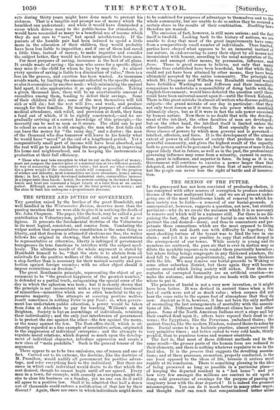THE SPHERE AND DUTIES OF GOVERNMENT.
THE question raised by the brother of the great Humboldt, and well handled in the Westminster Review, deserves more than the passing mention that we were able to give it in noticing the death of Mr. John Chapman. The paper, like the book, may be called a good contribution to Voluntaryism, political and social as well as re- ligious. It presents the fundamental doctrine of the Voluntaries in its most logical, consistent, and concise form. Combating the vulgar notion that representative constitution is the same thing as liberty, and that freedom is attained if elections are free, the writer follows his, original in showing, that whether the constitution be representative or otherwise, liberty is infringed if government transgresses its true functions to interfere with the subject need- lessly. The ultimate result of the whole argument is stated by Humboldt himself to be, "that the state is to abstain from all solicitude for the positive welfare of the citizens, and not proceed a step further than is necessary for their mutual security and pro- tection against foreign enemies; with no other object should it impose restrictions on freedom."
The great Benthamite principle, representing the object of go- vernment to be "the greatest happiness of the greatest number," is defended as a partial truth, antagonizing the special error of the day in which the aphorism was born ; but it is clearly shown that the principle is not inconsistent with a very tyrannical treatment of minorities—minorities -which are so often beneficial to the op- pressive majority. The attempts at securing positive welfare result sometimes in robbing Peter to pay Paul ; as, when govern- ment has undertaken public education, a penny would be taken from John at Aberdeen to pay for teaching William's son at Brighton. Society is but an assemblage of individuals, retaining their individuality ; and the only just interference of government is to proteet the one against the other—the few against the many, or the many against the few. The Post-office itself, which is or- dinarily regarded as a fine example of associative action, originated in the suppression of individual enterprise; and the attempts to regulate moral relations, which depend so much upon the develop- ment of individual character, introduce oppression and create a new class of "rnala prohibita." Such is the general tenour of the argument.
There appear to us to be two omissions, one of reason and one of fact. Carried out to its extreme, the doctrine, like the doctrine of M. Proudhon, would nullify all government for positive advan- tage, and refer everything back to the individual. But there are oases in which each individual would desire to do that which the rest desired, though he cannot begin until all are agreed. Every man in a town, for example, with scarcely an exception, might de- sire to close his business on a Sunday, yet no one can do it until all agree to a positive law. Shall it be admitted that half a dozen out of thousands could enforce a nullification of that law by their dissent ? Again, there are cases in which individuals might desire to be combined for purposes of advantage to themselves and to the whole community, but are unable to do so unless they be secured a certain share in the results of their combination. Enabling laws therefore are wanted.
The omission of fact, however, is still more serious; and the fact itself is twofold. Looking back to the history of nations, we are unable to deny that most of the great improvements have come from a comparatively small number of individuals. Thus limited, parties have obeyed what appears to be an immortal instinct of our nature, in endeavouring to carry their object by all means not inconsistent with honour, according to the usual acceptation of the word; and amongst other means, by persuasion, influence, and force. There is great reason to believe, not only that many reforms thus established have been beneficial, but that while they could not yet have been attained by other means, they have been ultimately accepted by the entire community. 'The principle for which Mr. Chapman and Wilhelm von Humboldt contend world have forbidden Washington and Jefferson and their immediate companions to undertake a responsibility of doing battle with the English Government; would have deferred the question until there could have been universal assent upon it—until the Greek Kalends. There is this great mistake in almost all writers who discuss political subjects—the grand mistake of our day in particular—that they not only treat reason as if it were the sole power which mankind ultimately obeys, but as if it were in fact the sole power exercised by human nature. Now there is no doubt that with the develop. ment of the intellect, the other faculties of man are developed; but on the other hand, the intellect itself is limited unless the other faculties also be developed. Most especially do we note three classes of powers by which man governs and is governed— intellect, affection, and force. It is the development of the utmost extent of power in all classes of society that produces the most powerful community, and gives the highest result of the capacity both to govern and to be governed ; but in the progress of man it does appear likely that in future, as well as in the past, the predominant governing influence may come from a minority, 'earnest in convic- tion, great in influence, and superior in force. So long as it is so, Government will continue to exercise a power larger than that delegated, and interference greater than that of mere protection; but the people can never lose the right of battle and of insurrec- tion.


































 Previous page
Previous page